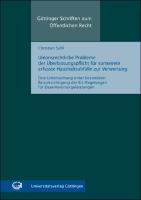Unionsrechtliche Probleme der Überlassungspflicht für sortenrein erfasste Haushaltsabfälle zur Verwertung - Eine Untersuchung unter besonderer Berücksichtigung der EU-Regelungen für Daseinsvorsorgeleistungen
Author(s)
Suhl, Christian,
Collection
AG UniversitätsverlageLanguage
GermanAbstract
Waste is a commodity, and in particular the separately collected, single-variety waste from private households such as waste paper is a highly coveted commodity that public bodies responsible for waste management, i.e. the municipalities, and private sector waste management companies compete for. The German recycling law (KrWG), which came into force in 2012, allows for this waste according to §§ 17, 18 KrWG an exception to the general obligation to hand over the waste to the public bodies responsible for waste management. However, the exception is so narrow that the competent authorities, which are often the responsible bodies for waste management at the same time, can easily ban the collection of private companies. This restricts the European free movement of goods and infringes EU competition law. The present work highlights these restrictions and infringements and examines whether they can be justified, in particular, by the exemptions for Services of General Economic Interest (SGEI). Insofar as this does not succeed, an amendment of the relevant regulations of §§ 17 and 18 KrWG is proposed. Abfälle sind Waren, und insbesondere die getrennt erfassten, d. h. sortenreinen Verwertungsabfälle aus privaten Haushalten wie beispielsweise das Altpapier sind heiß begehrte Waren, um die die öffentlich-rechtlichen Entsorgungsträger (örE), also die Kommunen, und private Entsorgungsunternehmen konkurrieren. Das 2012 in Kraft getretene KrWG lässt für diese Abfälle nach §§ 17, 18 KrWG eine Ausnahme von der grundsätzlichen Pflicht, die Abfälle dem örE zu überlassen, zu. Allerdings ist die Ausnahme so eng gestaltet, dass die zuständigen Behörden, die oftmals zugleich örE sind, privaten Unternehmen die Sammlung leicht verbieten können. Damit werden die Europäische Warenverkehrs- und Wettbewerbsfreiheit eingeschränkt. Die vorliegende Arbeit zeigt diese Einschränkungen auf und untersucht, ob sie insbesondere nach den Ausnahmeregelungen für Dienstleistungen von allgemeinem wirtschaftlichem Interesse (DAWI, Daseinsvorsorge) gerechtfertigt werden können. Insoweit dies nicht gelingt, wird eine Änderung der einschlägigen Regelungen der §§ 17 und 18 KrWG vorgeschlagen.
Keywords
Abfälle; Abfall; Abfallentsorgung; Deutsche Hochschule für Politik; Europäischer Gerichtshof; Kreislaufwirtschaftsgesetz; Vertrag über die Arbeitsweise der Europäischen Union; WarenverkehrsfreiheitDOI
10.17875/gup2018-1070ISBN
9783863953409OCN
1038399276Publisher
Universitätsverlag GöttingenPublication date and place
2018Classification
Law


 Download
Download Web Shop
Web Shop